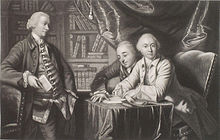Richard Edgcumbe, 2nd Baron Edgcumbe
Richard Edgcumbe, 2nd Baron Edgcumbe ( August 2, 1716 - May 10, 1761 ) was a British nobleman and politician .
Origin and youth
Richard Edgcumbe came from the Edgcumbe family . He was the second son of the politician Richard Edgcumbe and his wife Matilda Furnese and was baptized on August 12, 1716 in the Church of St Martin-in-the-Fields in London. After the early death of his older brother Piers, he became his father's heir. From 1725 he attended Eton College before joining the British Army in 1732 . Although he did little active service, he rose to major general until his death .
Political activity
Early election to the MP
In a by-election Edgcumbe was elected on December 4, 1742 as the successor to his father, who had been raised to Baron Edgcumbe , elected MP for the Borough of Plympton in Devon . In the general election in November 1747 he was elected a member of the Borough Lostwithiel and in the general election of 1754 he was elected member of the Borough Penryn . He was also mayor of Lostwithiel in 1744 and 1756. He usually supported the policies of Prime Minister Henry Pelham and his father, but showed little real political interest.
Grand tour, gambling addiction and taking on various offices
Dick Edgcumbe, as he was commonly known, was close friends with Horace Walpole , George Selwyn, and George Williams . Even as a young man, he regularly lost 20 guineas a day gambling at White's Club in London. His gambling addiction ran into financial distress so Henry Pelham secretly gave him an annual pension of £ 500. In view of his gambling addiction, his father sent him on a grand tour in the 1740s that took him to Constantinople and only returned from it seven years later. From Constantinople he brought orange trees back to England, for which the orangery was finally built in Mount Edgcumbe . Edgcumbe's inactivity and gambling addiction were also known to King George II , who in 1752 rejected the Duke of Newcastle's proposal for a higher pension or an office for Edgcumbe. It was only after Pelham's death in April 1754 that Edgcumbe became Lord of Trade before he was named one of the Lords of the Admiralty in December 1755 . He resigned from the Admiralty in November 1756 after becoming Comptroller of his Majesty's Household and on November 19 a member of the Privy Council .
Activity as Baron Edgcumbe
After his father's death, Edgcumbe inherited the title of Baron Edgcumbe in November 1758, making him a member of the House of Lords and leaving the House of Commons. In February 1759, he succeeded his father as Lord Lieutenant of Cornwall. In 1759 he became a recorder for Lostwithiel and Plympton. His annual income from family estates is said to have been around £ 4,000. In addition, his father is said to have left him a fortune of £ 20,000 so that Edgcumbe could finally settle his debts. However, while his father had had considerable influence in the general election in Lostwithiel, Grampound , Penryn, Fowey , Bossiney and Plympton, as well as in part in Mitchell , Edgcumbe neglected these contacts in the general election in 1761. He died at the age of 44.
Others
Despite his indolence and gambling addiction, Edgcumbe was considered talented and easy to get along with. As an amateur poet, he wrote poems, of which only The Fable of the Ass, Nightingale, and Kid and Ode to Health have survived, published after his death in the book The New Foundling Hospital for Wit (6, 1786, 107-10) were. Edgcumbe was also considered a good draftsman and painter. He himself is considered to have discovered the talent of Joshua Reynolds , one of whose first sponsors he was and for whom he made a study visit to Rome possible in 1749. Edgcumbe died of dropsy and was buried in Maker's church. He had remained unmarried, but he had four children with his lover Ann Franks (also Day ). Charles Jones presumably wrote the satirical report An Epistle from the Hon. R [ichard] E [dgcumbe] to his Dear Nanny [Day] , which was published in London in 1752, about this relationship . Edgcumbe then began a relationship with a woman known only by her nickname Kitten . He entrusted his children to the care of Horace Walpole. His heir became his younger brother George .
Web links
- LC Sanders, Michael Bevan: Edgcumbe, Richard, second Baron Edgcumbe (1716–1761). In: Henry Colin Gray Matthew, Brian Harrison (Eds.): Oxford Dictionary of National Biography , from the earliest times to the year 2000 (ODNB). Oxford University Press, Oxford 2004, ISBN 0-19-861411-X , ( oxforddnb.com license required ), as of 2004
- Eveline Cruickshanks: EDGCUMBE, Hon. Richard (1716-61), of Mount Edgcumbe, no. Plymouth, Devon. (History of Parliament Online, Ref Volumes: 1715–1754)
- Sir Lewis Namier: EDGCUMBE, Hon. Richard (1716-61). (History of Parliament Online, Ref Volumes: 1754–1790)
- Cracroft's Peerage: Baron Edgcumbe
- Richard Edgcumbe, 2nd Baron Edgcumbe of Mount-Edgcumbe on thepeerage.com , accessed August 31, 2017.
Individual evidence
- ↑ Cynthia Gaskell Brown: Mount Edgcumbe House and Country Park: Guidebook , Mount Edgcumbe House and Country Park, Torpoint 2003, p. 20
- ↑ Cynthia Gaskell Brown: Mount Edgcumbe House and Country Park: Guidebook , Mount Edgcumbe House and Country Park, Torpoint 2003, p. 38
| predecessor | Office | successor |
|---|---|---|
| Richard Edgcumbe |
Baron Edgcumbe 1758-1761 |
George Edgcumbe |
| personal data | |
|---|---|
| SURNAME | Edgcumbe, Richard, 2nd Baron Edgcumbe |
| ALTERNATIVE NAMES | Edgcumbe, Richard |
| BRIEF DESCRIPTION | British nobleman and politician |
| DATE OF BIRTH | August 2, 1716 |
| DATE OF DEATH | May 10, 1761 |

